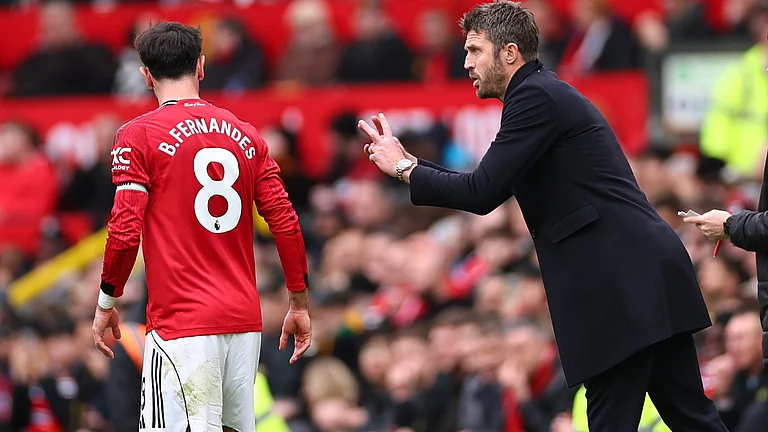A full car park is a compliment normally reserved for the mighty Australians. Especially since this was a Wednesday and not a particularly brilliant day—sunny but cold, a day for three sweaters and brandy in thermos flasks. Earlier, Indian tours would start without causing so much as a ripple. Have things changed? Perhaps not much.
Worcester in the English Midlands—the scenic drive from London takes you over hill and dale and early blossoming summer flower to one of the most beautiful grounds in the country—always kicks off the touring season. The moment is always associated, in English minds, with Bradman plundering hundreds of runs—and the full car park is probably just a sign of nostalgia and habit. For, the Indians have yet to make any impression here. And unless they do some-thing special, they won't. They've arrived, it seems, through the backdoor and been met with polite, dutiful attention.
You would not expect any cricket team to make much of a splash at this stage of the summer. Football is in the air. The FA Cup Final is just taking place. And this year, England hosts the European football championships in June—its first international tournament since 1966. And so, until the end of June, cricket will take second billing, at least in the popular press and television. By then, only one Test will remain. Should England perform above par in football, even good cricket may go neglected.
Again, the tour finds the English in their most concentrated navel-gazing mood. The disasters in the World Cup and South Africa have again shown that England are now a second class power. Ray Illingworth nearly lost his job as chairman of selectors. He has in any case relinquished his job as coach. And the English are less interested in the touring Indians than in how his successor, David Lloyd, does his job.
With appropriate theatricality, the first day at Worcester saw Lloyd announce, at a pre-match press conference, that he had a camera recording every movement by the Indians. The media immediately hailed this; England was at last catching up with other cricketing nations who have long employed such methods. A number of Fleet Street dailies instructed their photographers to take the picture of this spy cameraman. And Lloyd made more column inches than Vikram Rathore, who dominated the day's play with a masterly 165.
Reading the Sun or the Daily Mirror you would be hard put to appreciate that the Indians are here. To be sure, the quality dailies have been discussing some of the Indians. Sachin Tendulkar, of course, is known and compared to Brian Lara—the consensus is he is not quite as good. Javagal Srinath is respected, Anil Kumble even feared, Azharuddin creates wonder and Hirwani has an exotic touch. After that, most English pressmen will have problems recognising names in the new-look team.
So, on the opening day, English journalists clustered round Ramaswami Mohan, the veteran Hindu correspondent, checking how Vikram Rathore was spelt, what his antecedents were et al. Most newspapers carefully pointed out that the name is pronounced 'Rathod'. The general, cheerful tone betrayed a conviction that, for all England's woes, India will provide flimsy opposition. There's only Kumble, whose 100-plus wickets for the Northants last summer is still fresh in English minds. But Graeme Hick demolished both him and Hirwani in his 215, seen as a major declaration of intent. Even in that dismal Indian tour of 1993, when England lost all three Tests, Hick was the one success.
Of course, the English recog-nise that the Indians will make runs. Tendulkar, for one, will make them. And when Azhar is on song he is almost impossible to bowl to, says new England selector Graham Gooch. But then, India's attack is considered powder puff and few in England see them dismissing England twice. The press has also seized on the fact that India have played little Test cricket of late, only plenty of one-dayers. Indeed, as the batting against Worcester showed, too many Indian batsman are still playing one-day cricket.
Indian manager Sandeep Patil knows his team needs practice to get back into the five-day groove. But the way the tour is structured, it won't be playing much demanding cricket in the lead-up to the first Test on June 6 at Trent Bridge. After Worcester, it's Gloucester, then Sussex and possibly Glamorgan—none have a great bowling attack. Well, you might say, neither do England. But until the first Test, India won't meet England's best bowlers, so it will be difficult to judge the merit of the runs they score.
Even the bookmakers make England the favourites. At best, they are worried the series might be drawn. As in 1959, England's recovery is predicted to start at India's expense. History, certainly, is on England's side. India have won only two Test series in England (1971 and 1986) and have not won a Test series outside the subcontinent since 1986 (excluding the 1-0 victory in Sri Lanka in 1983). If past tours are any guide, the first Test will be crucial. Only if India can surprise England at Trent Bridge can the smug English facade crumble. For that, Kumble would have to go through English batsmen like a supercharged apple crumble, as Brian Johnston nicknamed him on the last tour.






















